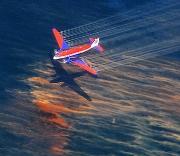12-9-10
By Justin Guay
Sierra Club Cancun Team
With a 36 member delegation, and thanks to volunteer participation and leadership, the Sierra Club has enjoyed a strong showing in Cancun that has helped to elevate our presence with colleagues, negotiators, and institutions on the global level. The Sierra Club delegation has met every other day to coordinate our efforts and inform staff and volunteers by bringing in speakers on critical issues. Notable speakers have included John Lynchberry from Birdlife International, Elizabeth May from the Green Party of Canada, as well as staff from WWF Mexico, and the Many Strong Voices Project. The Sierra Club International team would like to extend a special thanks to Fred Heutte, Glen Besa, Tyla Matteson, Allison Chin, Joseph Manning, Jim Dougherty and many others for their help in coordinating these meetings and overall Sierra Club efforts.

Heads in the Sand
The Sierra Club delegation has been busy building the momentum, and pressure needed to ensure that our politicians and leaders live up to international responsibilities and infuse positive momentum into the climate change negotiations here in Cancun. This past Friday led by Jim Dougherty, the Sierra Club and the Sierra Student Coalition teamed up with Bill McKibben of 350.org, and the Center on Biological Diversity to call on world leaders to get their heads out of the sand. An event aimed at calling attention to the danger climate change poses and the need for concerted global action. The event enjoyed worldwide coverage.
Coverage
· Reuters, LA Times, BBC, NPR, Washington Post, The Australian, The Hindu, Edmonton Journal, Euro news, Straights Times, SF Gate, Signon San Deigo News, Herald Online, and many more…
SSC Work & China-US Youth Climate Exchange
When our delegation wasn’t calling the world’s attention to the talks, the Sierra Student Coalition was busy pulling together rapid response calls back to US politicians, writing post cards to delegates, and organizing media events on the US/Chinese energy race. Perhaps the most impressive was the international bridges the SSC built through the China-US Youth Climate Exchange. The spirit of cooperation and understanding the event engendered between students from China and the U.S. was summed up well by Chen Yingao, a graduate student from Peking University, "Before Cancun, I didn't have a lot of experience communicating with American youth. The past five days have provided me a totally new view of the United States."
· A Reuters video segment on China-US Youth Climate Exchange
Policy Advocacy
As the talks moved into the second week Sierra Club staff ramped up efforts to break the death grip fossil fuel interests have on international climate politics by exposing coal for the dirty 19th century fuel that it is. We have focused most heavily on a strong push for the World Bank to clean up its energy lending including holding a side event, placing numerous articles, and making sure the Bank staff in Cancun knew we were watching them with the help of “Bank trackers”. We have supplemented these efforts with a strong administrative advocacy push to ensure the United States plays a constructive role in moving the ball forward on key issues such as Adaptation, Reduced Emissions from Deforestation and Degradation (REDD), Technology Transfer, Transparency, and Climate Finance.
Sierra Club United Nations Side Event: World Bank Climate and Energy Finance
The Sierra Club side event shone a much needed light on the World Bank’s coal lending at the global stage. The all star panel mediated by Stephen Kretzman of Oil Change International was made up of Sierra Club international allies from a broad swath of important emerging economies. Siziwe Khanyile from the South African NGO groundwork - who played an instrumental role in fighting the recent Medupi coal loan - spoke of the terrible impact Medupi has had on the health and livelihoods of affected communities. Srinivas Krishnaswamy from Vasudha Foundation India spoke about the importance of ensuring energy access for the poor – something large scale coal plants fail to deliver time and again. And Yoke Ling Chee from Third World Network spoke about the Bank’s destructive legacy, the need for it to clean up its act, and how future climate finance should be structured to ensure a positive outcome for developing countries. The event represented a strong step forward for our international work as it solidifies ties with South African and Indian colleagues which we have been building over the past year. We plan to continue working with and supporting our allies in their fight to protect communities facing destructive fossil fuel projects.
Bank Tracking
When staff wasn’t organizing public events for policy makers we were teaming up with the Bank Information Center, Oil Change International and various other NGOs to “track the bank”. This initiative was meant to keep up much needed pressure and make sure the Bank knew civil society was watching them. The highlight of these efforts came with Sierra Club Staff member Nicole Ghio posing as an employee handing out documents for a side event on World Bank lending and Climate Finance. She personally handed the World Bank Director of Environment Warren Evans a copy of our factsheet highlighting the Bank’s destructive coal lending and detailing our demands for revised energy lending (read all about it in her bank tracking blog below).
U.S. Administration Advocacy
Finally, our international climate program director and policy staff are pushing hard for progress on a climate fund that can help build a 21st century economy. This has included direct and frequent discussions with top U.S. negotiators and State Department officials to push them to agree to progress in critical areas – not block efforts in search of a “balanced outcome. In addition, we have contributed to coordinated efforts with other US NGOs through USCAN as well as international colleagues through CAN international to publicly pressure them with ECO articles and Fossil nominations.
ECO NGO Newsletter and Bunkers
Last but certainly not least we enjoyed a strong presence in the Climate Action Network International. CAN-I is a very influential grouping of NGOs which publishes a daily NGO newsletter – ECO - widely read by delegates and coordinates working groups on key issues as well as advocacy and media efforts at these negotiations. Fred Heutte led the Sierra Club charge as ECO editor helping us to get timely articles printed on key topics, working with a variety of working groups including the notorious LULUCF, as well as serving as an ambassador for the Club. At the same time Art Williams lead the very important work of the Bunkers Working Group (Aviation and Maritime Fuel). Art was instrumental in setting up meetings with delegates, coordinating advocacy, and pushing hard for a positive outcome on the Bunkers issue in Cancun.
Coverage · Sierra Club Cancun World Bank Side Event
· Coal articles: Coal’s low carbon pitch, World Bank and Coal
· ECO articles: coal in the CDM, The World Bank’s addiction to coal, the problematic role the US is playing in negotiations *to be posted (thanks to the tireless efforts of ECO editor and Sierra Club lead volunteer Fred Heutte)
· Blog’s: Evolution in Cancun, Bank Tracking Blog, Tree Hugger summary of Sierra Club activities in Cancun by Sarah Hodgdon, and many many more on the Sierra Club Delegation Blog
· World Bank Climate Finance Coal Action Alert
Status of the Negotiations
All of this brings us to an update on the talks themselves. Despite leading efforts to call out the US on their high risk strategy of a “balanced outcome” the administration continues to refuse to allow progress in areas ripe for agreement including reduced emissions from deforestation and degradation (REDD), Technology Transfer, and the creation of a Global Climate Fund. Top U.S. negotiator Todd Stern has continually reiterated the fact that a deal is to be had here in Cancun, yet despite positive overtures from the Chinese and the Indians on the all important transparency issue, the US continues to hold up progress. With only one day left it is impossible to say what the outcome of the negotiations will be but we will continue to push for steps forward - particularly on REDD and a global climate fund - that will shore up the fragile state of the talks and help the world to move forward in the fight against climate change.
The other key dynamic at play in Cancun is the fate of the Kyoto Protocol (KP). At the beginning of the talks the Japanese made official statements that they would not be seeking a second commitment period which has opened the door for other bad actors (including Canada and Russia) to join in the killing of this legally binding international protocol. As of now the fate of the KP is highly uncertain with many developing countries lobbying hard for its extension and many developed countries seeking an early exit.
Ultimately, Cancun could very well determine the fate of international negotiations. Without clear progress the talks may drift for years to come with key parties seeking other venues for cooperation. It is important that we understand that even without a new binding treaty or continuation of the KP the United Nations plays a critically important role as a global platform that brings the world together in the fight against climate change. The tough decisions we must face going forward are the nature of its role and how we can leverage the UNFCCC to ensure that we are fighting climate change and fossil fuel interests as aggressively as the science demands.
Justin Guay
International Climate Program, Sierra Club
+1 202.664.6460
Skype: guayguay2
























